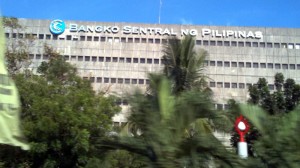BSP expected to raise SDA rate by 25 bps in Sept.
The Bangko Sentral ng Pilipinas will likely decide to raise the special deposit account rate by at least another 25 basis points on its Sept. 11 meeting, an economist from British banking giant HSBC said.
“BSP has spoken in hawkish tones in the past but has not delivered. Obviously, it started hiking reserve requirement and SDA (special deposit account) but there’s more scope to go especially if you look at 2013 in which they did (monetary) easing in a very aggressive pace—150-basis point SDA (rate reduction) and limiting access to SDA. As a result P750 billion was released into the economy and they need to tighten further to reverse it,” Trinh Nguyen, HSBC economist for Southeast Asia, said in an interview during her visit to Manila last week.
One of the reasons why the BSP appeared to be “dragging its feet,” Nguyen said, was that the local central bank seemed to be “comfortable” with where the peso was trading against the US dollar.
“Also if they tighten, that will add to their operating cost,” the Hong Kong-based economist said.
Generally, a weaker peso versus the US dollar favors sectors with foreign exchange earnings such as exporters as well as households supported by overseas Filipino remittances.
Nguyen said the Philippines’ trend growth rate had increased to 5.5 percent from 5 percent but without substantial increase in employment and infrastructure-building, she said this would jack up consumer prices.
The long-term fix is not raising interest rates but attracting more investments, she said, noting that the Philippines was now a “net saver” economy—where investments are much less than savings, resulting in current account surpluses and cash-awash banking system.
“The Philippines has a very easy challenge,” she said.
But while monetary tightening is not the long-term solution, Nguyen said the market was looking forward to the unwinding of the aggressive monetary easing sanctioned in 2013.
The BSP, for its part, raised the overnight borrowing rate or reverse repurchase agreement (RRP) by 25 basis points during its last monetary setting.
“This disappointed the market. Since the divergence of the rates in 2013, the scope of RRP is obviously limited on what it can absorb. It’s the SDA rate that is really able to mop up a lot of liquidity. We continue to see that in the future,” she said.
On whether the BSP will tinker some more with the RRPs, Nguyen said it would depend on the external environment, adding that the local central bank may seek guidance from the US Federal Reserve.
With the market appearing disappointed with the pace of tightening, the economist said “the peso will move sideways until you see hawkish tone.”
Nguyen said it would be “quite challenging” for the inflation-targeting BSP if it does not further tighten monetary settings.
Meanwhile, Nguyen said a 5.5-percent trend growth rate for the Philippines was still a very favorable trajectory and “not anything to be laughed at.” She noted the country’s “strong demographic story moving forward and that’s very favorable to growth.”
Asked about the impact of the Supreme Court ruling disallowing certain expenditures under the Disbursement Acceleration Program (DAP), Nguyen said this may have some psychological impact on fiscal spending in the second half of the year.
“People will be hesitant to spend more. If you look at fiscal spending in Philippines, it’s weak in first half and accelerates in second half. This year, there won’t be an acceleration which means it will not be a key driver for growth. Fiscal policy should be counter-cyclical but I don’t think it will happen this year,” she said.
On the other hand, she noted that overseas remittances were still growing, suggesting this would continue to be a key driver, especially in boosting consumption spending.















